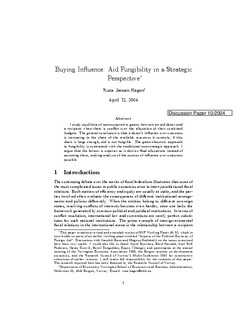| dc.contributor.author | Hagen, Rune Jansen | |
| dc.date.accessioned | 2006-08-03T07:23:24Z | |
| dc.date.available | 2006-08-03T07:23:24Z | |
| dc.date.issued | 2004-04 | |
| dc.identifier.issn | 0804-6824 | |
| dc.identifier.uri | http://hdl.handle.net/11250/162756 | |
| dc.description.abstract | I study equilibria of non-cooperative games between an aid donor and
a recipient when there is conflict over the allocation of their combined
budgets. The general conclusion is that a donor’s influence over outcomes
is increasing in the share of the available resources it controls; if this
share is large enough, aid is not fungible. The game-theoretic approach
to fungibility is contrasted with the traditional non-strategic approach. I
argue that the former is superior as it derives final allocations instead of
assuming them, making analysis of the sources of influence over outcomes possible. | en |
| dc.format.extent | 357963 bytes | |
| dc.format.mimetype | application/pdf | |
| dc.language.iso | eng | en |
| dc.publisher | Norwegian School of Economics and Business Administration. Department of Economics | en |
| dc.relation.ispartofseries | Discussion paper | en |
| dc.relation.ispartofseries | 2004:10 | en |
| dc.title | Buying influence : aid fungibility in a strategic perspective | en |
| dc.type | Working paper | en |
